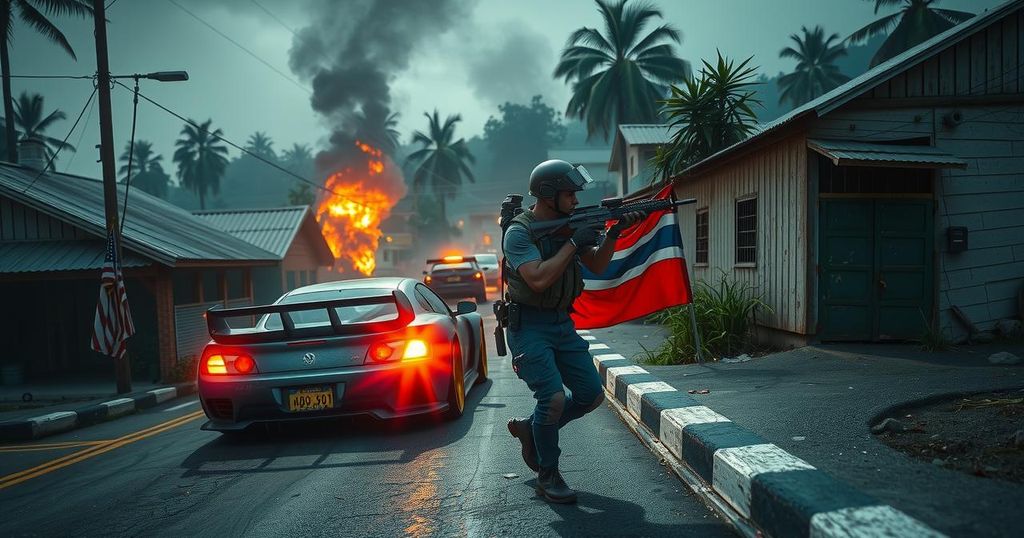Rwanda-backed M23 rebels have taken control of Masisi, a town in eastern DR Congo, marking the second town seized in recent days. This conflict, ongoing since 2021, has displaced hundreds of thousands. Mediations between DR Congo and Rwanda have faltered, and installation of the M23 raises concerns over humanitarian conditions.
Rebel forces aligned with Rwanda have successfully seized the town of Masisi, located in the eastern region of the Democratic Republic of Congo (DR Congo), as reported by multiple outlets. This marks the second town taken by the M23 rebel group within a mere two days, contributing to the ongoing territorial gains witnessed by the organization in the mineral-rich North Kivu province since it re-emerged in 2021. The ongoing conflict has led to the displacement of hundreds of thousands of individuals, exacerbating an already dire humanitarian situation.
In the wake of these developments, Angola has attempted to mediate discussions between Congolese President Félix Tshisekedi and Rwandan President Paul Kagame; however, these negotiations have stalled recently. Alexis Bahunga, a member of the North Kivu provincial assembly, expressed his deep concern regarding the situation, stating the town’s capture is a significant blow leading to a potential humanitarian crisis, urging the government to enhance military efforts in the area.
A resident from Masisi reported that the M23 conducted a meeting with local inhabitants, professing their intent to “liberate the country.” The town, which serves as the capital of its namesake territory, has a population of approximately 40,000 residents and is situated 80 kilometers (50 miles) north of Goma, the provincial capital that briefly fell under M23 control in 2012.
In a series of aggressive maneuvers, the M23 captured the neighboring settlement of Katale the previous Friday. There were earlier concerns that the group may threaten Goma, home to around two million residents, but hostilities had calmed until a resurgence in fighting began in December. In July, the Rwandan government acknowledged a United Nations report that indicated the presence of about 4,000 Rwandan soldiers supporting M23 forces in the DR Congo.
Rwanda contends that the Congolese government has failed to adequately address the longstanding conflicts in the eastern regions, even alleging that certain officials have affiliations with individuals linked to the 1994 Rwandan genocide. The M23, which initially formed as a protection front for the Tutsi ethnic minority, has faced longstanding criticism from various quarters, which posit that the group functions primarily to enable the exploitation of the region’s rich mineral resources, including gold and cobalt, vital for technology industries. Recently, the DR Congo government has initiated legal action against Apple over allegations of utilizing conflict minerals, a move that led the technology company to terminate sourcing agreements with the nation.
The ongoing conflict in the eastern Democratic Republic of Congo encompasses a complex backdrop of historical grievances, ethnic tensions, and geopolitical dynamics. Rebel groups, particularly the M23, have emerged from a series of conflicts that have lasted for decades, often fueled by accusations against the Congolese government for failing to protect ethnic Tutsis and improving local conditions. Rwanda’s involvement has been particularly contentious, as it is accused of leveraging the conflict to gain access to valuable mineral resources abundant in the region. This scenario has led to significant humanitarian crises, drawing international attention and intervention efforts.
The recent capture of Masisi by M23 forces underscores the instability rampant in the eastern Democratic Republic of Congo and highlights the urgent need for effective military and humanitarian responses to counter the crisis. With Angola’s mediation efforts having stalled, the fate of hundreds of thousands displaced remains precarious. The historical context and the socio-political dynamics at play will require robust international cooperation to address the underlying issues fueling this conflict.
Original Source: www.bbc.com






